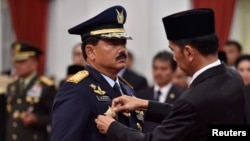The new head of Indonesia’s armed forces, Air Force chief Hadi Tjahjanto, is seen as a close ally of President Joko “Jokowi” Widodo, who had a tense relationship with the retiring General Gatot Nurmantyo, an outspoken figure who is thought to have political ambitions of his own.
Tjahjanto was sworn in last Friday and has spent several stints in Solo, the Central Java city that is also the hometown of current President Jokowi, who was the city’s popular mayor before he ascended to the nation’s highest office.
Tjahjanto’s and Jokowi’s families are said to be close and the appointment will likely be a relief for the latter, who is the first Indonesian president without military ties.
Tjahjanto also served as Jokowi’s “military secretary” from 2014 to 2016.
He grew up in an Air Force family in East Java and was reportedly known as “otak setan,” or demon brain, as a promising high school student in Malang. Tjahjanto is now 54 years old, so he could theoretically serve his full four-year-term unlike Gatot, who resigned shortly before he turned the mandatory retirement age of 58.
“For the first time in three years, we can say that Jokowi has finally found his man as the [Indonesian military] commander,” said Evan Laksmana, an analyst at the Center for Strategic and International Studies in Jakarta. “Hopefully this will give Jokowi the impetus to invest a little more in military leadership, not just with Hadi but all around.”
A more subdued leader
“We’re probably going to see less political maneuvering from Tjahjanto,” said Laksmana, compared to Gatot. Gatot was known for holding off-the-cuff press conferences and maintaining a generally high public profile through entanglements like being barred from entering the United States just last month.
“I don’t think he will be assertive as Gatot, who has very clear ambitions for higher office,” said Yohanes Sulaiman, a defense lecturer at General Achmad Yani University. “Hadi knows he is lucky to become the head of the military despite some discussion about problems with his leadership in the Air Force,” said Sulaiman, like the controversial purchase of helicopters by the military last year.
New priorities
Tjahjanto has outlined five priorities for his term, ranging from “cyber war” to terrorism to the South China Sea.
The emergence of non-state actors with varying motives has increased instability in a number of areas like the Middle East, Iraq, Syria and Asia and North Korea, said Tjahjanto. He stated the need for the military to deal with “contemporary threats and transnational crimes,” not just conventional warfare.
“Every military commander brings his own plans and goals,” said Laksmana. “Rebuilding the air force command will be more prominent under Tjahjanto… there are existing plans, for example, to expand air force bases, especially on the outer islands of the country, which haven’t been a major priority under the last commander.”
With regards to his overall agenda, Laksmana suggested that Tjahjanto’s outlook “skews external, and possibly more maritime, in outlook” to that of his predecessor, whose agenda included influencing the domestic discourse.
“But I doubt you will see super drastic changes when it comes to actual policies,” he said, in part because Tjahjanto is somewhat junior compared to his peers, so there will be a “bargaining and accommodation” period while he establishes relationships to carry out his agenda.
Gatot’s Legacy
It is safe to say that Gatot will not simply be retiring into a quiet life next year. Just before his term ended, he shuffled 85 high-ranking officers from across the military into new roles, seemingly to leave his imprint on the internal command.
Several actors who might challenge Jokowi in his 2019 reelection bid come from the armed forces, from Gatot to retired General Prabowo Subianto, who narrowly lost to Jokowi in 2014. That being said, a recent poll indicated Jokowi is far and away the most popular candidate for the next presidential election, and the appointment of Tjahjanto may further help manage his relations with the military.




